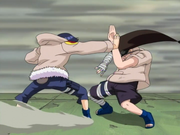No edit summary |
Ravenlot 27 (talk | contribs) m (let's keep one image for the illustration at least) Tag: sourceedit |
||
| (78 intermediate revisions by 41 users not shown) | |||
| Line 1: | Line 1: | ||
| + | [[File:Gentle fist.png|thumb|The Gentle Fist style of fighting.]] |
||
| − | '''Fighting Styles''' are systems of combat. They are either [[Taijutsu]] or strategy and tactics. In Taijutsu or Ninjutsu, different fighting styles are systems of codified practices and traditions of training for physical education, exercise and combat. A ninja's fighting style is an approch to combat that make use of that ninja's strengths and talents; one example is [[Sakura Haruno]], in part II her fighting style takes full advantage of her precise [[Chakra#Chakra Control|chakra control]], resulting in her [[Chakra Enhanced Strength]]. |
||
| + | A "'''fighting style'''" is the characteristic ability upon which most or even all of a [[shinobi]]'s [[jutsu]] are based. In the case of [[taijutsu]] users, their fighting style dictates their stance in combat and how they strike their opponents; examples include the [[Strong Fist]] and [[Gentle Fist]]. In the case of [[ninjutsu]] users, their fighting style is a cornerstone to all their tactics and by which they are most easily identified; examples include [[Sai]]'s [[Super Beast Imitating Drawing]] and [[Konan]]'s [[Dance of the Shikigami]]. Ninjutsu users' fighting styles may alternatively be defined by what tool or resource they most commonly employ rather than a single ability; examples include [[Gaara]]'s [[sand]] or the [[Inuzuka clan]]'s [[ninken]] partners. |
||
| − | == |
+ | == See Also == |
| ⚫ | |||
| − | For example, the taijutsu style known as [[Strong Fist]] is a both an '[[wikipedia:Styles of Chinese martial arts#External styles|External]]' style and a '[[wikipedia:Hard and soft (martial arts)#Hard techniques|Hard]]' style martial art: |
||
| − | |||
| − | * An 'External' martial arts style is a fighting style which is characterized by the focus on fast, explosive movements and developing the practitioner's physical strength and agility. Training regimes for external styles focus around the practitioner's muscular power, speed and application, developing their [[wikipedia:Muscle memory|muscle memory]] and their stamina, building it all up to the desired 'hard' physical level for real combat. Flashback's of [[Rock Lee]] show him training rigorously for hours doing exercises such as punching and kicking a hard, wooden training post, hundreds of [[wikipedia:Squat (exercise)|squats]], as well as [[wikipedia:Aerobic exercise|cardiovascular exercises]] such as [[wikipedia:Skipping rope#Jumping rope techniques|skipping]] with a [[wikipedia:Skipping rope|jump rope]]. |
||
| − | |||
| − | * A 'Hard' martial arts style is a fighting style which is characterized by its approach by intercepting and countering an opponent's incoming force with equal and/or greater force: In these styles, the practitioner either directly blocks the incoming attack with an attack of their own of head-on force or by cutting through the attack at an angle with one's own force. These styles rely more on one's external power; in the case of a Strong Fist practitioner, its the user's superior strength and physical conditioning, that brings success. The practitioner fights head-on offensively, and [[wikipedia:The best defense is a good offense|their offense becomes their defense]]. |
||
| ⚫ | |||
| − | Another example of a fighting style is the Taijutsu style known as [[Gentle Fist]], which is a both an '[[wikipedia:Styles of Chinese martial arts#Internal styles|Internal]]' style and a '[[wikipedia:Hard and soft (martial arts)#Soft techniques|Soft]]' style martial art: |
||
| − | |||
| − | * An 'Internal' martial arts style is a fighting style which is characterized by its emphasis on the use of the practitioner's mind to coordinate the leverage of the relaxed body, (as opposed to the use of brute strength,) and the internal development, circulation, and expression of their chakra. A practitioner of a internal style understands that an opponent is only as strong as their weakest joint. Training regimes for internal styles include [[wikipedia:Meditation|meditation]] and exercising control over their internal chakra flow. |
||
| − | |||
| − | * A 'Soft' martial arts style is a fighting style is characterized by its approach by receiving the aggressor's force and momentum and turning it against him by leading the attack in another direction. In these styles, the user seeks to turn their opponents own strength against them, to bring them off-balance, diffusing the energy of the incoming attack, and, in the case of the Gentle Fist, to take them down from the inside. A 'soft' style is less about ones physical strength and more about ones internal power, in the case of of a Gentle Fist practitioner, its the user's superior chakra control and precision that brings success. This fighting style empathizes control and defense. |
||
| − | |||
| − | == Combat Tactics == |
||
| − | In [[Taijutsu]] and [[Ninjutsu]], a fighting style also refers to an approach to fighting opponents. One example is [[Naruto Uzumaki]]'s fighting style - as a 'power' type, Naruto's fighting style exemplifies raw power, charging straight in and clearing a path through the enemy's defensive line, making a way in for the rest of the team. Another example is [[Gaara]]'s fighting style - as a 'stationary' type, Gaara makes use of his sand to reach his opponents and attack from a distance, using "catch and crush" tactics. The [[Aburame clan]]'s approach to combat revolves around 'search and seizure' tactics, seeking out the opponent and restricting their movements to capture them dead or alive. |
||
| − | |||
| − | An 'Offensive' fighting style is favored by 'power' types like [[Naruto]] and the [[Fourth Raikage]], [[Ē]], utilize brute force in combat. Likewise, a 'Defensive' fighting style is favored by ninja like [[Neji]] and [[Hinata]], who can use the defenses of the [[Gentle Fist]] style as their offense. |
||
| − | |||
| − | A 'Supplementary' fighting style involves working in co-ordination with others to bring down enemy forces. an example of supplementary fighting formations in the series are the [[Formation ino-shika-cho|fighting formation]] used by both the [[Previous Ino-Shika-Cho|former]] and the [[Team Asuma|current Ino-Shika-Cho Trio]]. Such a fighting style allows for your weaknesses to be covered by one of your other team-members, and likewise, you can cover for their weak points: Alone, [[Ino]]'s [[Mind Body Switch Technique]] is a slow-moving technique that is useless if the target can dodge this, so if [[Shikamaru]] can first restrain the target, then Ino can use her technique to take control of them. |
||
| − | |||
| − | Fighting styles are also mainly divided into long-range, mid-range, and close-range type fighters. [[Puppeteers]], such as [[Kankuro]], are long-range fighter, but are weak at close-range combat. The [[Wind Release|Wind Style]] compliments a close-to-mid-range fighter who favors brute force. The [[Fire Release|Fire Style]] is a style that compliments a mid-to-long-range fighter. |
||
| − | |||
| − | ==See Also== |
||
| ⚫ | |||
| ⚫ | |||
Revision as of 11:26, 26 December 2015

The Gentle Fist style of fighting.
A "fighting style" is the characteristic ability upon which most or even all of a shinobi's jutsu are based. In the case of taijutsu users, their fighting style dictates their stance in combat and how they strike their opponents; examples include the Strong Fist and Gentle Fist. In the case of ninjutsu users, their fighting style is a cornerstone to all their tactics and by which they are most easily identified; examples include Sai's Super Beast Imitating Drawing and Konan's Dance of the Shikigami. Ninjutsu users' fighting styles may alternatively be defined by what tool or resource they most commonly employ rather than a single ability; examples include Gaara's sand or the Inuzuka clan's ninken partners.
